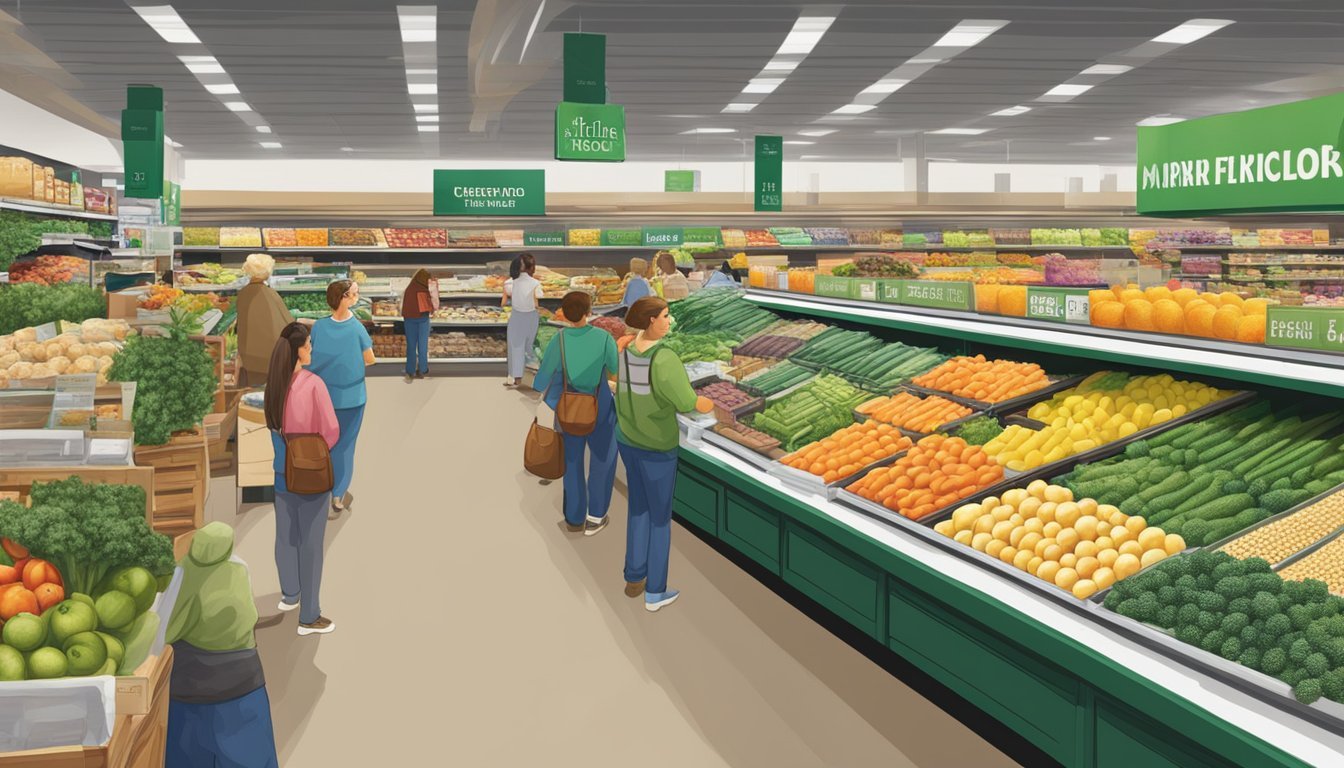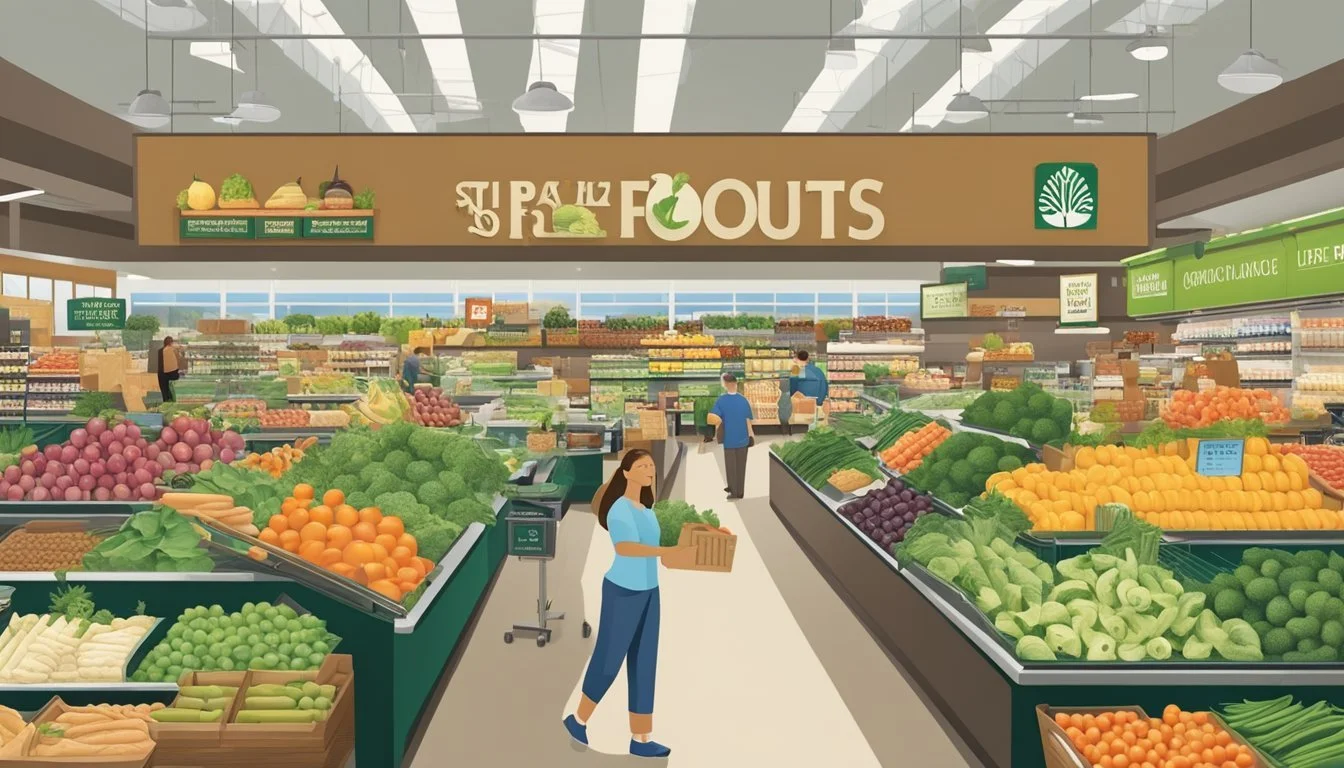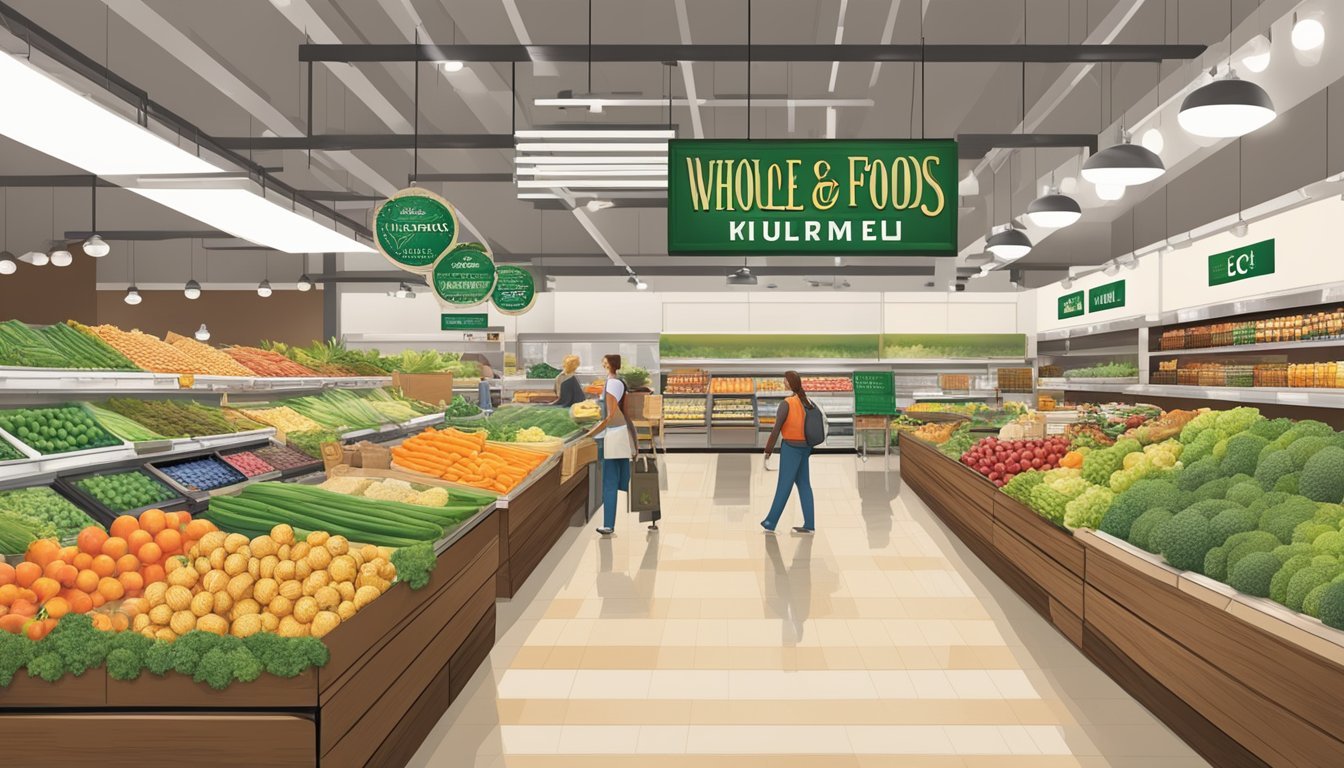Whole Foods Market vs Food Lion
A Comprehensive Comparison
Part of Our Grocery Store Guide with Details on Whole Foods Market Prices and Food Lion Prices
When it comes to choosing a grocery store, shoppers often consider a variety of factors such as product quality, price, and shopping experience. Whole Foods Market and Food Lion stand as two prominent players on opposite ends of the grocery spectrum. Whole Foods Market has carved out a niche for itself as a purveyor of organic and natural foods, typically associated with a high standard of quality and a focus on health-conscious products.
Food Lion, on the other hand, has positioned itself as a more budget-friendly option offering competitive prices without a specialized focus on organic goods. It appeals to families and individuals looking to stretch their grocery dollars while still accessing a diverse selection of items. As customers navigate their choices, they assess the stores' brand positioning, with Whole Foods attracting those who prioritize organic options and Food Lion catering to cost-saving preferences.
Both retailers create distinct shopping experiences. Whole Foods Market emphasizes a clean and upscale environment, often with additional amenities, such as in-store dining and an array of specialty goods. In contrast, Food Lion focuses on practicality and convenience, ensuring that shoppers can quickly and easily find all the staples they require at lower price points. Shoppers' decisions between these two grocery markets may ultimately hinge on their individual needs, values, and financial priorities.
History and Background
When discussing the history of grocery stores in America, two names often surface: Whole Foods Market and Food Lion. Each has a unique backstory that has helped shape their brand recognition and presence in the retail food industry.
Whole Foods Market Origins
Whole Foods Market planted its roots in Austin, Texas. It opened its first store in 1980, reflecting a commitment to quality natural and organic foods. John Mackey, one of the original founders, was instrumental in the development of the store that would soon become an iconic brand in America. By 1984, Whole Foods Market began to broaden its reach, launching stores in Houston and Dallas. A few years later, in 1988, the company acquired the Whole Food Company in New Orleans, marking its expansion outside of Texas.
Food Lion Evolution
Food Lion's story started a bit earlier, with its first store opening in 1957 under the name Food Town in Salisbury, North Carolina. The brand eventually became known as Food Lion and by the 1980s, had established itself as a key player in the regional supermarket scene. With more than 1,100 supermarkets across 10 states, including Delaware, Georgia, Kentucky, and Maryland, Food Lion solidified its reputation as a reliable grocery store offering affordability and convenience.
Both Whole Foods Market and Food Lion have navigated the waters of the American grocery industry with distinct strategies, catering to different customer bases and evolving through decades of service and growth.
Store Layout and Design
When comparing Whole Foods Market and Food Lion, the distinctions in store layout and design are noticeable, with each brand catering to a different shopping experience. Whole Foods emphasizes an upscale ambiance and intuitive navigation, while Food Lion focuses on practicality and straightforward layout.
Ambiance and Aesthetics
Whole Foods Market is known for its inviting environment that features a modern and natural design with extensive use of wood finishes and warm lighting. The ambiance is crafted to create a premium shopping experience, highlighting their specialty sections like the bakery and produce with aesthetically pleasing displays. In contrast, Food Lion offers a more utilitarian atmosphere with functional lighting and standard shelving, focusing on efficiency and affordability over stylistic touches.
Whole Foods Market:
Wood finishes and warm lighting
Specialty sections are prominently showcased
Food Lion:
Functional lighting and standard shelving
Greater emphasis on affordability
Navigation and Sections Layout
In terms of layout, Whole Foods Market arranges its sections to guide customers through a curated journey. The produce section, often at the front, is vibrant and appears as a farmer's market, while the centrally located bakery invites customers with fresh aromas. The shelves are strategically located to create an easy, organic flow from one section to the next. Food Lion adopts a more traditional supermarket layout, with a clear and uncomplicated structure making it easy for shoppers to find staple items quickly without unnecessary detours.
Whole Foods Market:
Produce section designed like a farmer's market
Bakery central, with strategic shelf placement
Food Lion:
Clear, traditional supermarket structure
Easy-to-find essentials without complex navigation
Product Range and Quality
Both Whole Foods Market and Food Lion cater to different markets with their varied product ranges and quality. Consumers can expect a discernible difference in the selection and quality of natural and organic items, meat and bakery goods, as well as prepared and packaged foods at these grocery stores.
Produce and Organic Options
Whole Foods Market is renowned for its wide array of organic produce and commitment to quality. Shoppers can find a diversity of fruits and vegetables, many of which adhere to strict organic standards. Food Lion offers a decent selection of produce as well, but Whole Foods Market leads with better quality ingredients and more extensive organic options.
Meat, Dairy, and Bakery
The meat section at Whole Foods Market boasts natural and organic meat products, with a focus on animal welfare and sustainable farming practices. In comparison, Food Lion provides a variety of meat choices at more competitive prices. Both stores have dairy and bakery departments, yet Whole Foods Market often features items with an emphasis on natural ingredients and artisanal quality.
Prepared and Packaged Food
Whole Foods Market's prepared food section garners attention for offering healthier options, including ready-to-eat meals that cater to various dietary needs. Its packaged food products emphasize organic and natural ingredients. Food Lion carries an array of packaged foods, often at lower price points, and includes a range of convenient prepared food selections for budget-conscious customers. The store's line of 365 by Whole Foods Market provides an extensive selection of ready-to-eat and packaged goods, although these may be priced higher than similar products at Food Lion.
Pricing and Value for Money
When considering Whole Foods Market and Food Lion, pricing strategies and value stand out as pivotal factors. Whole Foods Market is known for high-quality offerings with a corresponding price tag, while Food Lion focuses on delivering competitive prices to budget-conscious consumers.
Everyday Prices and Deals
Whole Foods Market has historically been associated with higher prices due to its organic and premium products. Recent surveys indicate that Whole Foods Market's produce prices are now 7% cheaper than some competitors'. Food Lion, on the other hand, operates with prices around 12% lower than the average grocery store. Customers at Food Lion can save $1,500 to $2,000 annually, positioning it as a strong contender for those seeking lower everyday prices.
Membership Discounts and Special Offers
Whole Foods Market offers additional savings to Amazon Prime members, including exclusive deals and an additional 10% off on sale items. Food Lion, while not providing the same level of membership benefits as a Prime membership, promotes special deals through its loyalty program. This creates an opportunity for regular shoppers to receive discounts and rewards over time.
Customer Experience and Services
Whole Foods Market and Food Lion offer differing customer experiences tailored to their respective customer bases. The former emphasizes organic and high-quality products with additional services, whereas the latter focuses on affordability and cost-efficiency.
Customer Service Quality
At Whole Foods Market, customer service is a significant focus. Staff there is often described as knowledgeable and friendly, providing assistance not just at checkouts but also in aisles and specialty departments such as the bakery and hot food sections. Food Lion also values customer service, with an approach that emphasizes speed and efficiency to cater to a customer base seeking a quick and cost-effective shopping experience.
Extra Services and Amenities
Whole Foods Market distinguishes itself with an array of extra services. Patrons can enjoy in-store dining options and a variety of ready-to-eat meals, elevating the shopping experience. The hot food bar and in-store bakery provide fresh options for on-the-go consumers. In contrast, Food Lion offers fewer in-store amenities, focusing primarily on providing a streamlined, self-service-oriented environment that efficiently serves its customers.
Brand Philosophy and Corporate Practices
Whole Foods Market and Food Lion approach their brand philosophies and corporate practices with distinct priorities centered on sustainability, community involvement, and the responsible sourcing of products.
Sustainability and Ethical Sourcing
Whole Foods Market has emphasized a commitment to sustainability and ethical practices in its business model. The company prides itself on offering products that are sourced responsibly and support the well-being of the environment. This involves stringent standards for animal welfare, sustainable seafood, and organic farming practices. Whole Foods Market's dedication to these values is reflected in the selection and quality of the products they offer to their customers.
Food Lion, while perhaps less vocal about its ethical sourcing, still takes measures to ensure responsible operations. Their sustainability efforts extend to energy conservation and waste reduction across stores. Food Lion has also shown a commitment to carry a range of certified sustainable products, catering to the environmentally-conscious consumer.
Community Involvement and Social Responsibility
Whole Foods Market believes strongly in community involvement, regularly participating in local events and supporting food banks. Their Whole Planet Foundation is indicative of their broader social responsibility goals, focusing on poverty alleviation through microcredit in communities worldwide where the company sources products.
Food Lion, too, has demonstrated a commitment to the communities they serve. Food Lion's strategies include hunger relief efforts and educational programs. They participate in food drives and have established scholarships, proving that their community efforts are an integral part of their corporate identity.
Both Whole Foods Market and Food Lion's practices show that the stores not only aim to be successful retailers but also strive to make a positive impact in the areas of sustainability and community wellbeing.
Market Presence and Growth
In the competitive landscape of American grocery retailers, Whole Foods Market and Food Lion have carved out significant niches. Each brand has tailored its growth strategy and market presence to serve distinct consumer bases across various regions.
Regional Footprint
Whole Foods Market, known for its organic and natural food offerings, firmly holds its ground in urban and upscale suburban areas. It operates in multiple states around the U.S., with a strong focus on wealthier demographics who prioritize the quality and sourcing of their food.
Contrastingly, Food Lion, with its "Easy, Fresh & Affordable" strategy, boasts a wide regional footprint in the Mid-Atlantic region, and its over 250 stores have seen a robust refurbishment initiative. The retailer appeals to a broad customer base, emphasizing cost-effectiveness without compromising on freshness.
Expansion and Competition
Whole Foods Market has experienced significant growth, particularly since its acquisition by Amazon. This association has led to innovative developments, especially in the realm of e-commerce and technology, challenging competitors on digital fronts.
Meanwhile, Food Lion focuses on the expansion of its market presence within its established regions, optimizing store performance post-refurbishment. Its growth has been steady, maintaining competitiveness by leveraging its re-engineered store model to attract value-seeking customers.
Both brands are continuously adapting in a retail environment fraught with competition. While Whole Foods Market emphasizes quality and innovation, Food Lion counters with accessibility and value, each expanding their own distinct brand of market presence in America.
Comparative Analysis
In assessing the performance of Whole Foods Market and Food Lion, this section examines customer feedback and industry recognition to gauge which store offers a competitive edge in the grocery sector.
Customer Surveys and Reviews
Whole Foods Market is known for its high-quality, organic, and natural food selections. Consumer surveys often note that Whole Foods customers are generally satisfied with the product quality and store ambiance, but they may also mention higher prices compared to other chains. On the other hand, Food Lion garners praise for its affordability and its presence in regions where economy is a significant factor for shoppers.
Grocery Store Pros Cons Whole Foods High-quality organic options, positive store environment Higher price point Food Lion Cost-effective, convenient Product selection less specialized
Industry Standing and Awards
In the sphere of industry accolades, Whole Foods Market has a history of recognition among health-conscious consumers and maintains a strong brand association with sustainability and quality. Although specific awards were not cited in the search results, its standing in the market as a purveyor of premium goods is well-established. Contrastingly, Food Lion operates with a different business model, focusing on affordability and accessibility to a broad customer base, and industry acknowledgment may revolve around its value offerings rather than organic expertise.
Grocery Store Notable Recognition Whole Foods Reputed for premium products and organic leadership Food Lion Recognized for delivering cost-effective grocery options
Conclusion
When comparing Whole Foods Market and Food Lion, shoppers have distinct experiences based on their priorities. Whole Foods Market caters to a customer base seeking organic and high-quality items. They are known for their wide selection of natural foods and emphasis on health-conscious products. Their prices, however, might be steeper, reflecting the quality and sourcing of their inventory.
Food Lion, on the other hand, is typically seen as a more budget-friendly option. They offer a variety of conventional grocery items and their prices are often lower than those at Whole Foods Market. The trade-off may come in the form of a narrower selection of organic and specialty products when compared to Whole Foods.
For those who prioritize organic products and a wide array of health-focused options, Whole Foods Market is likely the better choice, despite the higher cost. Conversely, Food Lion appeals more to shoppers looking to stretch their dollar further, without as strong an emphasis on organic and specialty selections.
In the end, the decision between Whole Foods Market and Food Lion rests on individual preferences regarding grocery shopping, personal values on food quality, and one’s budget. Each store serves its purpose and excels within its own niche in the grocery market landscape.








